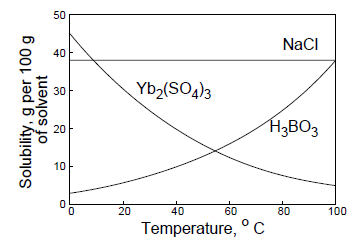Question:
The plot of solubility of some salts against temperature is given on the right. A salt like $\ce{NaCl}$ can be recovered fully, when dissolved in a solvent and the solvent is removed by evaporation. Choose the correct statement(s):
- No heat is absorbed or released when $\ce{NaCl}$ is dissolved in water.
2. More heat is released when the ions of $\ce{Yb2(SO4)3}$ are solvated than that absorbed when the ions are separated.
3. The heat of solution is negative for $\ce{H3BO3}$.
4. When $\ce{AlCl3}$ is dissolved in water and the water is evaporated, solid $\ce{AlCl3}$ is recovered.
My approach: (1) is clearly correct. (3) and (4) are clearly wrong. My confusion lies with (2).

